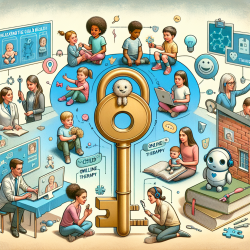The intersection of medicine and consumer culture is a complex space, particularly when it involves emerging technologies like nutrigenetic testing. This field offers DNA-based nutritional advice directly to consumers and has sparked significant debate over its scientific validity and regulatory classification. The research article "Negotiating the boundary between medicine and consumer culture: Online marketing of nutrigenetic tests?" provides a comprehensive analysis of this phenomenon, offering valuable insights for practitioners in various fields, including online therapy services in educational settings.
The Emergence of Nutrigenetic Testing
Nutrigenetic testing companies have carved out a niche by offering personalized dietary advice based on genetic testing. This service blurs the line between medical diagnostics and consumer products, creating a new category that challenges traditional regulatory frameworks. The research highlights how these companies position their products between clinical genetics and lifestyle choices, appealing to consumers seeking personalized health solutions.
The Role of Online Marketing
The study examines how nutrigenetic testing companies use online platforms to market their services. They employ strategic framing techniques to present their products as both scientifically credible and consumer-friendly. This dual approach is crucial for gaining consumer trust while navigating regulatory challenges. For practitioners in online therapy services, understanding these marketing dynamics can enhance client engagement strategies.
Implications for Practitioners
The insights from this research are particularly relevant for professionals involved in online therapy services within educational settings. Here are some key takeaways:
- Understanding Consumer Expectations: Just as nutrigenetic companies tailor their messaging to appeal to health-conscious consumers, online therapy providers can benefit from understanding the expectations and motivations of their clients. This knowledge can inform service delivery and marketing strategies.
- Navigating Regulatory Landscapes: The research underscores the importance of staying informed about regulatory developments. For therapy providers, ensuring compliance with legal standards is crucial for maintaining credibility and trust.
- Leveraging Technology: The use of digital platforms for service delivery is a common thread between nutrigenetic testing and online therapy. Practitioners should explore innovative ways to utilize technology for enhancing client interaction and service efficiency.
The Importance of Further Research
The study also highlights areas where further research could be beneficial. For instance, exploring how consumers perceive the credibility of online health services can provide deeper insights into effective communication strategies. Additionally, examining the long-term impact of personalized health advice on consumer behavior could inform future service development.
Conclusion
The findings from the study on nutrigenetic testing offer valuable lessons for practitioners in various fields, including online therapy services in education. By understanding the interplay between medicine and consumer culture, professionals can better navigate the challenges and opportunities presented by emerging technologies.










